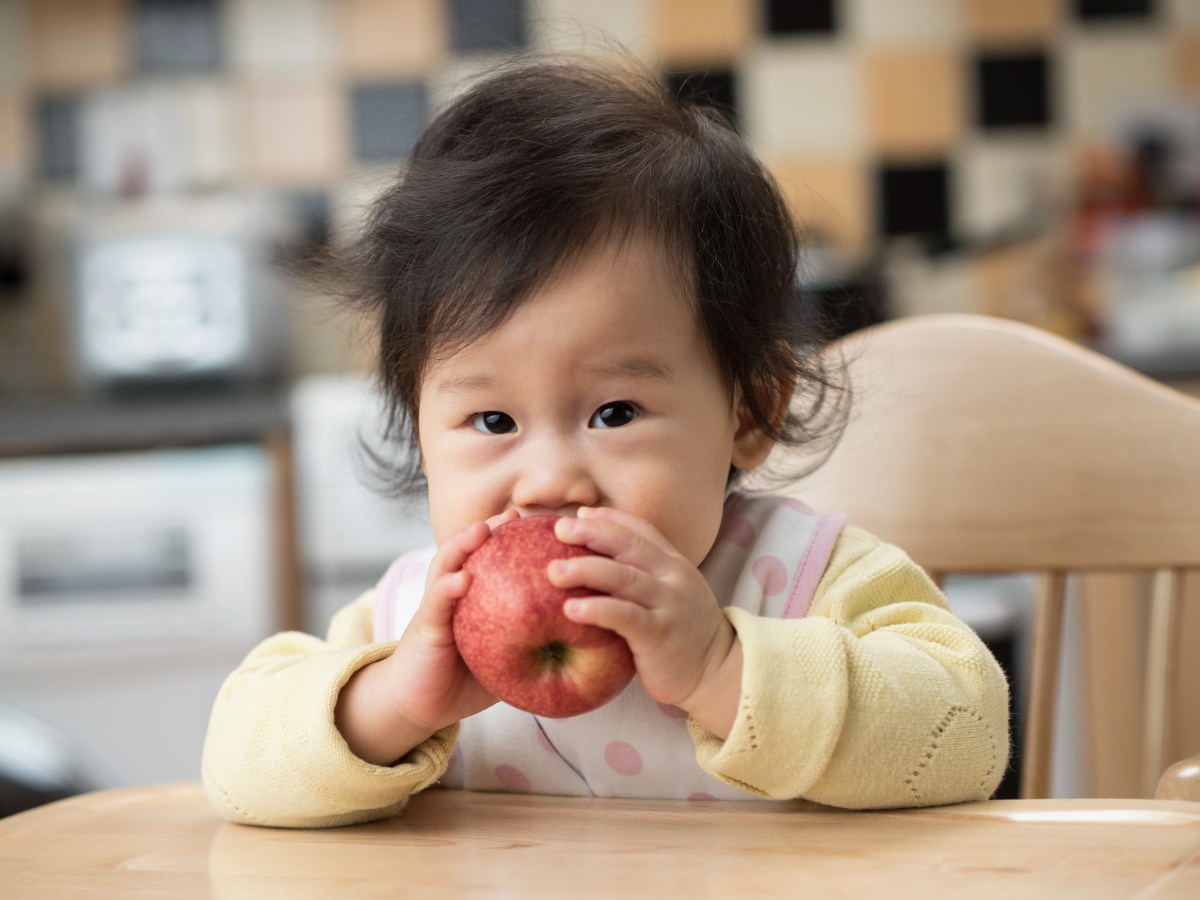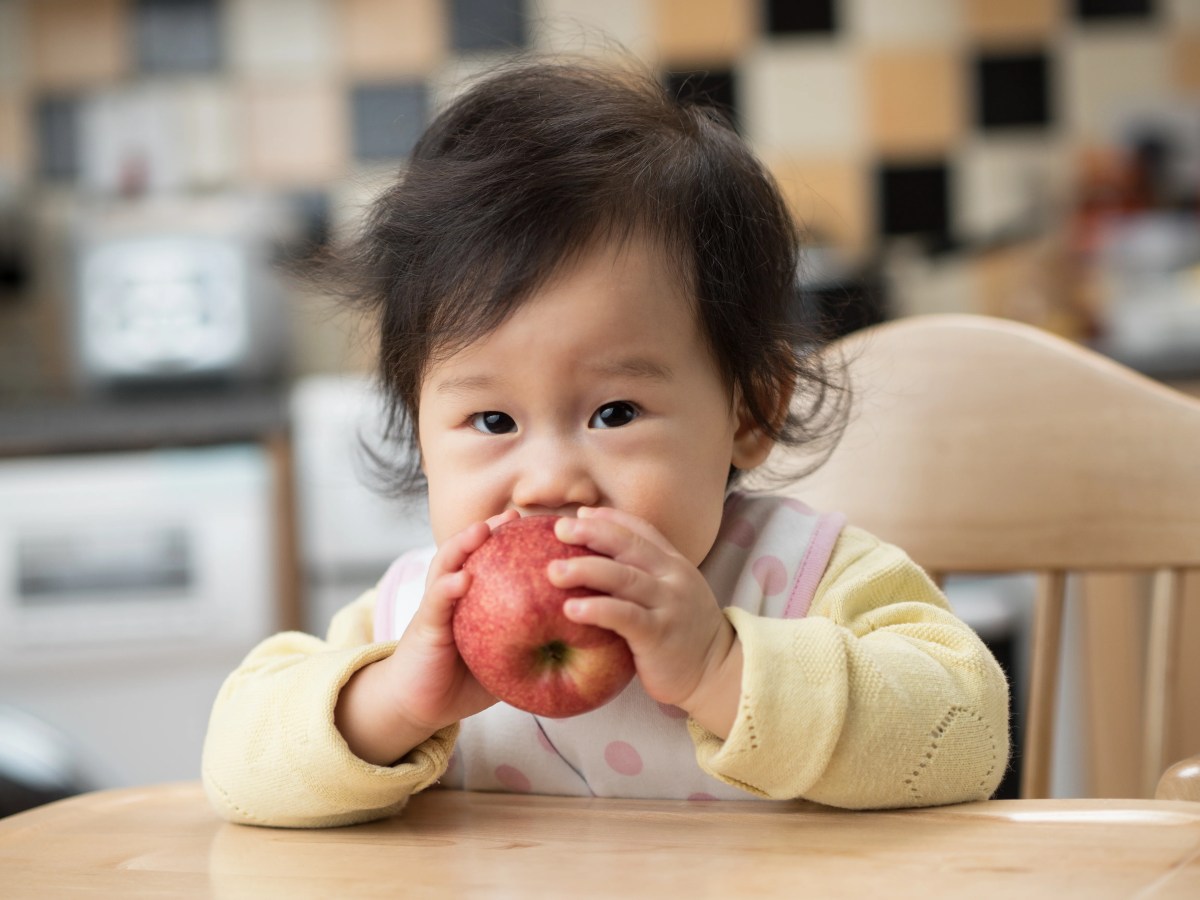Your cart is currently empty!
What Should I Be Feeding My 11 Month Old?

Ensuring that your baby gets the nutrients they need to grow and develop is one of the most important things to do, especially during the first 2 years of your baby’s life. In fact, the nutrition your baby gets during this time sets the stage for their nutrition and health for the rest of their…
Here’s What You Need To Know:
- By 11 months, you baby will begin eating more independently.
- Solid foods are essential for your baby’s development at this time.
- Iron is especially important for your child in the first 2 years.
- This is the time when your baby’s brain develops 80% of their adult brain.
- Don’t be afraid to let your baby explore with spoons, their hands, and smearing food all over their face.
Your 11 Month Old and Breastmilk
Breastmilk or formula is your baby’s main source of nutrients, hydration, and calories from birth until they reach six months. This is when you can begin introducing solids into their diet! However, breastmilk remains a vital part of their nutrition.
Even when you begin introducing your baby to solids, continuing to breastfeed ensures that they do not lack the key nutrients they need to thrive. It helps them keep getting the hydration they need too! As your baby reaches 11 months, it is still important to provide breastmilk or formula feedings as this remains an important part of their nutrition!
To ensure your baby gets enough breastmilk or formula as you’re introducing solids, try breastfeeding before you offer your baby solids. You should aim to breastfeed your baby or give them formula 3 to 4 times per day. This usually adds up to about 24 to 30 ounces!
By 11 months, you baby will begin eating more independently. They will grab spoons themselves and begin interacting with the world around them. Yes, this might mean plopping their hand right into their bowl, but embrace the mess! They’ll also enjoy chewing more and experiencing textures and tastes.
While continuing to breastfeed or provide formula, solid foods are essential for your baby’s development at this time. Your baby can begin eating solids at around 6 months of age, but by 11 they’ll need different amounts.
By 11 months, your baby will need around 3 meals and 2 to 3 snacks every day. For each feeding, you should give your baby around half a cup of food on top of breastfeeding. This could mean a few tablespoons of one food and a few tablespoons of another, plus breastmilk.



1. How many calories does my 11-month-old need?
Good question! Every baby develops at their own rate. Some days your baby may go through feedings quickly, and other days your baby may seem pickier and uninterested. Paying attention to hunger signs in your baby is one of the best ways to ensure you’re giving your baby enough food. When they’re full, they will let you know!
But we know that while you’re listening and watching for hunger cues, you may want some guidelines to keep track of your baby’s calories!
Babies aged 0-1 should eat approximately 90-120 calories per kg in body weight. So, this means that if your baby weighs 9 kg, they might consume 900 calories per day, and 400-500 of these calories should come from breastmilk or formula!
2. Your 11-Month-Old and Nutrients
Your baby’s growing taste buds and preferences can be exciting for them and for you! But while they’re exploring taste and texture, it’s important to make every bite count.
Your baby’s nutritional needs change as they grow and change, so this is why we have carefully crafted foods that provide your baby with the exact nutrients they need to grow and thrive!
These nutrients are iron, magnesium, potassium, vitamin B6, zinc, and vitamin C. Here’s why:
3. Iron is a major nutrient for brain development
Iron is an essential nutrient for your baby’s brain growth and development! It promotes processes such as cellular respiration, and iron is also a large supporter of your baby’s brain. It supports neural development, your child’s cognitive health, and their overall ability to learn.
Iron is especially important for your child in the first 2 years. This is the time when your baby’s brain develops 80% of their adult brain. In fact, half of the energy your baby consumes go straight to their brain, so feeding them a diet rich in iron is vital for their brain health! It’s also important to ensure your baby consumes enough iron at 11 months because your baby’s main source of iron has been your breast milk. Once solids are introduced, your baby still relies largely on breastmilk. However, as they consume more and more solid foods and snacks, it’s important to make sure iron is present in them since they won’t be consuming as much breast milk.
There are two kinds of iron: heme iron and nonheme iron. Heme iron is found in meats and is more easily absorbed by the body. Non-heme iron is found in plants such as legumes, vegetables, and grains!
4. Other Important Nutrients for Your Baby
Magnesium is a nutrient that supports overall health and nutrition in your baby. It helps regulate nerve and muscle function, helps keep blood sugar levels balanced, and helps make protein, bones and DNA. At 11 months old, your baby needs around 75 mg of magnesium per day. Sources of magnesium include nuts, leafy greens, beans, whole grains, oats, and avocados.
Potassium is an electrolyte, which means it helps the body build proteins and muscle essential for physical function and strength. Foods rich in potassium promote your baby’s muscle growth and physical strength. In other words, as your baby begins trying to stand by themselves, wobble on their own two feet, and explore the world, potassium can help fuel their strength and movement!
Some great foods containing potassium are sweet potatoes, tomatoes, carrots, beans, squash, bananas, peaches, dates, prunes, and green leafy vegetables.
Vitamin B6 is an essential vitamin responsible for brain and nervous system function. It helps neurotransmission in the body and the production of important hormones for your baby.
Good sources of vitamin B6 can be found in whole grains, seeds, legumes and beans, nuts, bananas, papayas, fish, and lean meats.
Your baby’s immune system experiences vital development during the 11-month milestone as well!
Zinc is an essential nutrient in the body responsible for making proteins, forming DNA, and fuels metabolism function. It is also a vital nutrient for the immune system. Zinc cannot be synthesized from our bodies, however, so it’s vital to ensure your baby is getting zinc from their food!
Vitamin C is an antioxidant, which means it protects our bodies from free radicals that could produce harm to our bodies and brains. Vitamin C is also an important nutrient our bodies need to form cartilage, muscle, blood vessels and bones and helps each of these heal when injured or infected. As a bonus, vitamin C also promotes the absorption of iron in the body!
How can you ensure your 11-month-old baby consumes enough zinc and vitamin C? Look for zinc in beans, nuts, red meat, oysters, and look for vitamin C in oranges, citrus fruits, kiwis, broccoli, and bell peppers.
(You can also check out our other blog post to learn more about key nutrients to support your baby’s immune system!)

Tips for Feeding Your Baby
As you’re working to ensure your baby gets the nutrients and vitamins they need to thrive, feeding your baby may not always go as smoothly as you’d like. Don’t worry! We’ve got some helpful tips for feeding your 11-month-old:
Your baby doesn’t seem to like a certain food? Take it slow!
When you introduce a new food to your 11-month-old, it’s normal for them to take it slow. Especially because their tastes and preferences are developing during this time, they may just be confused by new foods. Go slowly while introducing new foods and remember that it’s okay if your baby doesn’t take to it right away. You can always try introducing a new food before meals for a few days until your baby does show signs that they want to eat it.
Your baby doesn’t like eating with a little spoon? Let them explore it a little.
When your baby begins eating solids at 6 months, they don’t understand what a spoon is. But at 11 months, your baby begins to grasp concepts of cause and effect! They may just be learning that spoons are what carries food to them in addition to a nipple or bottle.
As you’re introducing solids and new foods, don’t be afraid to let your baby explore with spoons, their hands, and smearing food all over their face. We know it’s a mess, but it’s your baby’s way of interacting with the world around them. And if they can get a nutritious diet while they explore? Even better.
Your baby doesn’t seem to be getting a balanced diet? Try Yumi’s organic crafted baby food.
If your baby doesn’t seem to be eating a balanced diet, it may be because of the baby food manufacturer or provider. Many baby foods have preservatives, artificial flavors, additives, and processed foods. So, while it may look like your baby is eating the recommended foods, they still may not be reaching their recommended nutrition goals for vitamins and minerals.
But, don’t fear. This is why we do what we do here at Yumi! We’re committed to making organic, nutrient-dense food made specifically for your baby at all of their different nutrient stages.

Summary
As your baby reaches the exciting 11-month milestone of their life, every bite counts! That’s why we have carefully formulated organic, nutrient dense foods to help grow and shape your baby so they can flourish and develop.
By making sure your baby gets the amount of breastmilk, solid food, nutrients, and vitamins they need to thrive, you can ensure a better, healthier future for your baby!
Sources
- https://www.cdc.gov/nutrition/InfantandToddlerNutrition/breastfeeding/how-much-and-how-often.html
- https://www.cdc.gov/nutrition/InfantandToddlerNutrition/foods-and-drinks/how-much-and-how-often.html
- https://www.healthychildren.org/English/ages-stages/baby/feeding-nutrition/Pages/How-Often-and-How-Much-Should-Your-Baby-Eat.aspx
- https://americanpregnancy.org/healthy-pregnancy/pregnancy-health-wellness/natural-sources-of-vitamin-b-during-pregnancy-24422/#:~:text=Vitamin%20B6%20is%20crucial%20for,serotonin%20and%20norepinephrine%2C%20key%20neurotransmitters









